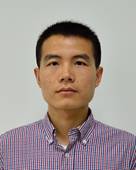唐龙-二等奖
时间:2015-11-24 点击: 次 编辑:迟宗宝 作者:admin姓 名
唐龙
学 号
2012102140033

研究方向
GPS电离层监测
硕/博
2012级博士
电子信箱
ltang@whu.edu.cn
导 师
张小红
学术成果:
期刊论文
[1] Zhang Xiao-hong, Tang Long. Detection of ionospheric disturbances driven by the 2014 Chile tsunami using GPS total electron content in New Zealand. Journal of Geophysical Research, 2015 ( SCI)
[2] Tang Long, Zhang Xiao-hong, Li Zhe. Observation of ionospheric disturbances induced by the 2011 Tohoku tsunami using far-field GPS data in Hawaii. Earth, Planets and Space, 2015, 67. (SCI)
[3] Zhang Xiao-hong, Tang Long, Traveling ionospheric disturbances triggered by the 2009 North Korean underground nuclear explosion, Ann. Geophys, 2015,33(1): 137-142.. (SCI)
[4] Zhang Xiao-hong, Tang Long, Daily global plasmaspheric maps derived from COSMIC GPS observations, IEEE Transactions on Geoscience and Remote Sensing, 2014, 52(10):6040-6046. (SCI)
[5] 张小红, 唐龙. COSMIC 低轨卫星 GPS 接收机差分码偏差估计[J]. 地球物理学报, 2014, 57(2):377-383. (SCI)
[6] 张小红, 唐龙, 郭博峰. 利用改进的 SRTI 法研究中尺度电离层行波扰动[J]. 地球物理学报, 2013, 56(12): 3953-3959. (SCI)
[7] 唐龙,张小红. 基于北斗GEO卫星观测数据探测中尺度电离层行波扰动[J].武汉大学学报(信息科学版),2013,38(12):1409-1412.(EI)
[8] 张小红, 朱峰,薛学铭,唐龙. 利用Allan方差分析GPS非差随机模型特性[J].测绘学报,2015,44(2):119-127.(EI)
学术会议
[1] Tang Long, Zhang Xiao-hong. A Multi-Step Multi-Order Numerical Difference Method for Traveling Ionospheric Disturbances Detection. The 5th China Satellite Navigation Conference, Nanjing, China, May, 2014. (EI, Oral presentation, 年会优秀报告)
[2] Tang Long, Zhang Xiao-hong. Traveling ionospheric disturbances detection after the 2011 Tohoku tsunami using GPS TEC observations in Hawaii. Institute of Navigation, Florida, USA, September, 2014. (Oral presentation)
[3] Zhang Xiao-hong, Tang Long. Using Ground-based GPS measurement to observe Ionospheric disturbances associated with the earthquake, tsunami and UNE events. 5th TibXS Workshop, Guiyang, China, August, 2014. (Oral presentation)
[4] Tang Long, Zhang Xiao-hong, Lin Xiao-jing and Chen Yu-yang. Estimation of Compass Satellite Differential Code Biases Using Combined GPS/Compass Observation. The 3th China Satellite Navigation Conference, Guangzhou, China, May, 2012. (EI, Oral presentation)
经验交流:
简单谈一下这几年学习过程中的心得体会。做科研首先是要选好题,相信大家都能认识到这一点的重要性,这里我就不多谈。在做科研的过程中,我觉得比较重要的两个方面是研究方法和态度。
首先谈一下科研方法。我将其总结为多看、多想和多试。“多看”是指多看相关领域的文献,主要是国外的文献。比较好的文献搜索工具是谷歌学术。在科研初期阶段,可以搜索领域类的经典文献,理解相关的原理;在科研途中,可以搜索领域内最新文献,紧随学科的发展。“多想”是指多想想我自己还能做什么,在“多看”的基础上,我们已经了解别人所做的工作,看看自己能否继续向前推进。“多想”是科研中体现自己创新点的过程,也就是获取“idea”的过程。我自己一般喜欢睡觉前多想想,这个时候我的思维相对活跃些。大家可以根据自己的实际情况,选择“多想”的时间段。在“多想”得到idea后,下一步就应当“多试”了。“多试”就是将自己的想法不断的进行尝试,一个想法不能成功,可以接着尝试另一个想法。通过不断的尝试,对于具体的问题就会认识的更加深刻,离成功也会愈来愈近。
再谈下对科研的态度。同样可以总结为信心、恒心和专心。信心是力量的源泉,有信心就会有一个乐观的状态,就有充满激情的奋斗精神,其实大家都一样,只要通过努力都可以成功。恒心是成功的护法使者,有了明确的目标和必胜的信心,就应当为这个目标不懈奋斗,在科研的过程中要耐得住寂寞,坚持到底才能走向成功。专心可以提高学习效率,充分利用宝贵的时间。在科研的过程中,做到这“三心”,才能最终做出成果。
上一篇:许超钤-一等奖
下一篇:没有了
 访问手机版
访问手机版